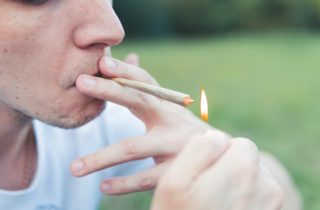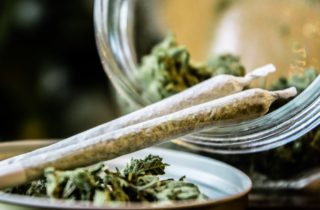Although marijuana is legal in several states for both recreational and medicinal use, regular and heavy use of marijuana can lead to addiction. The DEA still considers cannabis a schedule 1 substance because of the addiction risk, and its therapeutic effects are still in dispute on a federal level. While marijuana is not as dangerous as drugs like meth or cocaine, it can cause some long-term health effects in certain individuals.
Is Marijuana Addictive


Marijuana Addiction
Is Marijuana Addictive?
Marijuana is one of the most popular drugs used in the U.S., with more than 94 million people admitting to using the drug at least once in their lifetime. At the time of arrest, up to 40% of all male arrestees test positive for the drug. After alcohol, marijuana is the most frequently found drug in the bodies of drivers involved in fatal car crashes. Despite how glamorized marijuana is in pop culture and the therapeutic qualities it may have, no substance, including marijuana, is 100% safe.
What are the addictive qualities of marijuana?
Marijuana is also called cannabis, and it’s a plant that produces more than 100 cannabinoid chemicals that interact with the human body when ingested. The health supplement CBD is one of these cannabinoid chemicals, but it is not addictive and isn’t the chemical in marijuana that gets a person high. The cannabinoid chemical in the cannabis plant is called THC, which stands for tetrahydrocannabinol.
THC impacts the sympathetic nervous system, increasing heart rate, blood pressure, and the body’s need for oxygen. It acts as a vasodilator and is the chemical in marijuana that makes a person “high.” THC is known to increase feelings of anxiety and paranoia if too much is consumed and can even induce a panic attack in an at-risk user. Almost half a million people are admitted to emergency rooms in the U.S. each year because of this side effect.
The cannabinoid compound THC is the addictive part of the plant. People who regularly and heavily use marijuana can become both physically and mentally addicted to the effects of THC. When they stop using marijuana or try to cut back, they will experience withdrawal symptoms. Also, many marijuana users will mix the dried leaves and flowers of the plant with tobacco as a quick and easy way to smoke the plant and get high. However, this only increases a person’s risk of addiction when they mix two addictive substances and use them simultaneously.
Who is at-risk for marijuana addiction?
Anyone can become addicted to drugs or alcohol, and there is no concrete way to predict why some people can try a drug and become hooked, while others can try a substance once and never feel a compulsion to use it again. But several risk factors can increase a person’s chances of addiction and drug abuse.
- Having a mental health disorder
- Having a close relative with a substance use disorder
- Being from a lower socioeconomic group
- Obtaining lower levels of education
- Being between the ages of 18 and 25
When it comes to marijuana addiction, being a young male, and trying the drug for the first time before age 18 is associated with a higher risk of addiction. Also, studies on adults older than age 26 who abused drugs shed light on the following marijuana statistics:
- 62% of people who used marijuana before age 15 went on to use cocaine.
- 9% went on to abuse heroin
- 54% abused mind-altering prescription drugs
Other surveys on marijuana use have found that 30% of regular marijuana users have some form of marijuana use disorder. A marijuana use disorder is when someone is dependent on the drug to various degrees. Dependence occurs when a person stops using the drug or cuts back, and they experience withdrawal symptoms. These withdrawal symptoms compel them to start using marijuana again to alleviate the effects and to feel normal. A marijuana use disorder is a full-blown drug addiction when a person can’t stop using the drug even if using it causes severe and adverse consequences in their life. When people start having financial, legal, and relationship issues because of marijuana use but won’t quit, it’s indicative of addiction disorder. Fortunately, there is help for marijuana use disorder and marijuana addiction.
What happens when a person who is dependent on marijuana stops using it?
Withdrawal symptoms occur when someone is dependent or addicted to a drug. With marijuana addiction, the following symptoms will occur within two days after cessation:
- Intense cravings to use
- Insomnia
- Decreased appetite
- Fatigue
- Restlessness
- Irritability
- Anxiety
- Stomach ache
- Headache
These withdrawal symptoms tend to peak within a week or two after cessation, and then gradually taper off. For most people, withdrawal symptoms will subside and disappear within one month after they quit using marijuana. However, some users will go on to experience intermittent cravings for marijuana. If a person was abusing marijuana as a way to alleviate mental health disorder symptoms, they are at risk of relapse or using a different substance to cope if they don’t get outside medical help.
How can someone get help for marijuana addiction?
Drug rehab centers can put people in touch with a team of qualified therapists and drug abuse counselors who can help them overcome marijuana dependency. People who develop an addiction to drugs and alcohol have specific triggers for drug use that counseling and rehab can help them uncover. During therapy, patients are able to create a plan for avoiding certain triggers, or learn how to cope with them in ways that don’t include using marijuana for relief.
Attending a rehab center for detox and withdrawal also keeps patients in a safe, drug-free environment, so they aren’t exposed to drugs or harmful influences while trying to get through the withdrawal process. This lessens the chance of relapse and increases the chances of success and achieving sobriety.
If you or a loved one are struggling with marijuana dependency, there is help. Please contact the drug abuse counselors and therapists at Windward Way to explore your treatment options.




